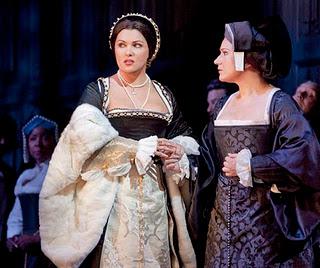Anna Netrebko's Anna Bolena at the Met.

Royal rivals: Anna Bolena (Anna Netrebko, left) and
Giovanna Seymour (Ekatrina Gubenova) square off in
the Met's new production of Anna Bolena.
Photo by Ken Howard © 2011 The Metropolitan Opera.
The Metropolitan Opera's Anna Bolena, starring Russian super-soprano Anna Netrebko in the Met's first-ever production of the 1830 Donizetti classic, combines the best of all worlds: a strong cast, singing brilliant music, in a striking production by David McVicar. This is the first of three Donizetti "Queen" operas to be directed at the Met by Mr. McVicar: Maria Stuarda and Roberto Devereux will follow in future seasons.
In singing bel canto opera, it is easy to fall into the trap of focusing too much on the singers, with the technical demands posed by a composer's ornamentation often out-weighing the plot. Mr. McVicar's production avoids these mistakes. He chose simple sets, lush costumes and an approach that lets the singing come first but incorporates the history, and tragedy of Anne Boleyn.
Ms. Netrebko is currently a jewel among international opera stars: she is a woman of great pulchritude, and no mean singer. But what impressed in Anna was how the soprano brought dramatic weight to the small, seemingly insignificant lines of dialogue that drive the plot forward. Her attention to detail helped elevate Anna from bel canto pot-boiler to the realm of music drama.
Ildar Abdrazakov is unsubtle, swaggering and brash: just right for Enrico (Henry VIII.) He made Enrico a willful, unjust jerk whose love duets with Giovanna dripped with insincerity. The bass' dark-hued instrument matched the simple oak-and-walnut sets, exploding through the texture of the rich Hunting Quintet and the Sextet that ends the first act.
Despite fighting a cold (and asking the audience for its indulgence) Ekaterina Gubenova presented a strong performance as Giovanna (Jane) Seymour, the rival to Anna's Anna. The two singers locked horns in the Act II duet, generating fiery chemistry as Anna discovered that she was being framed--and replaced by her lady-in-waiting. The duet was just the first highlight of a strong second act.
As Percy, American tenor Stephen Costello had a solid evening. His hair-raising "Vivi tu" (almost cut before this production's premiere) was sung with passion and infused with meaning. Tamara Mumford excelled in travesti, as the treacherous, doomed court musician Mark Smeaton. She was especially moving in the second half, beaten and brutalized after confessing to Henry's thugs. Bass Keith Miller provided strong and support as Rochefort.
To ring down the curtain on his heroine's sad, short life, Donizetti gave Anna three back-to-back arias: the opera's famous mad scene. Ms. Netrebko brought sweet, supple tone to the first two sections, singing of her desperate situation and of past happiness with Percy. The chorus provided able support here, commenting with the orchestra on her wrought emotional state.
Ms. Netrebko turned on the jets for "Coppia iniquita," the famous cabaletta where the about-to-be-axed Anna unleashed her venom on Henry and Jane Seymour. Ms. Netrebko sang this powerful aria as an indictment, of her wayward, homicidal husband, unleashing her contempt on the entire audience. As the soprano stood on the lip of the Met stage, soaring with majestic fioratura technique, this was more than just a vocal showpiece. It was a fitting end to one of the best new Met productions of this century.

